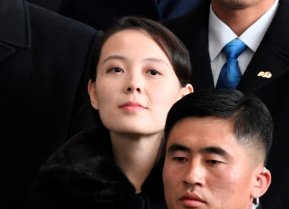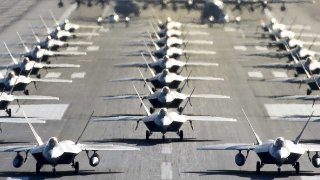The Real Reason North Korea Is Threatening War
With Kim Jong-un’s recent statements that he considers the Republic of Korea (ROK) the “primary enemy” and no longer seeks peaceful unification, analysts in Korea and the United States are rightly concerned with the possibility that he may conduct an unprecedented provocation or even an attack on the ROK.
The alliance must counter Kim Jong-un’s reckless provocations with immediate and decisive military responses and show him that he cannot survive if he uses nuclear weapons. Otherwise, his momentum will escalate more aggressively. Israel’s bombing of Syrian nuclear facilities in 2007 is a prime example of what a proper response looks like. The risk of North Korean nuclear threats becomes increasingly unbearable over time. Physically striking to prevent this risk would uphold U.S. and South Korean security.
Strengthening information operations, or what the regime calls psychological warfare, is essential to provide North Korean elites, military leaders, and residents with ways to challenge the oppressive regime. Psychological warfare against North Korea can expose the injustice of Kim Jong-un’s regime, present a vision for future prosperity, and provide options for the elites and second-tier military leadership. The use of the full range of information capabilities to penetrate the regime, from leaflets and loudspeakers to broadcast media and individual electronic devices, could go a long way in shattering the deification of the Kim family. Kim Jong-un fears external worldviews and cultures that can destroy his cult of personality and undermine his regime.
Kim’s actions are supported by his belief that the ROK and the United States no longer have the will to deter him. Therefore, deterrence must be restored, but words, exercises, and shows of force are not sufficient. Only actions will suffice. Although it is counterintuitive for some, only action will prevent escalation.
One potential action is to obtain the capability to shoot down a North Korean missile. This is difficult because the regime is careful not to fire its missiles within the engagement envelopes of any missile defense systems. Successfully bringing one down would require positioning missile defense systems in locations along the track of the missile but not able to defend the ROK.
Since Kim does not believe the alliance can attack him in his command bunker, a demonstration of the destruction of an underground bunker may influence Kim’s calculus. This would have to be very public with international observers.
If Kim plans an action after the election of Trump around March 2025, the alliance should consider reinstating Team Spirit, formerly one of the largest exercises in the free world, to be prepared to defend against North Korean attack.
Again, counterintuitively, none of the above actions proscribe diplomacy. Such decisive alliance action may be the only way to show Kim that diplomacy is his only option. We must remember the regime’s long history of deception and lies in its diplomatic activities. But the alliance should never give up on diplomacy if only to keep Kim engaged and in check.
The Korean Question Must be Solved
As long as the Kim family regime remains in power, the existential threat to the ROK will continue. North Korea will remain a rogue actor, and its malign actions will have enduring global effects. Therefore, while restoring deterrence is a short-term requirement, the alliance must take a long-term view about solving the Korean question, as stated in Paragraph 60 of the 1953 Armistice Agreement.
The path to unification must come from within North Korea. It cannot be externally imposed. Therefore, the alliance must execute a new strategy to help the Korean people in the North with an upfront approach to human rights. A sophisticated and comprehensive information campaign that gives the people the knowledge and tools to create change could allow all Koreans to pursue a free and unified Korea. But this can only happen if it rests upon a foundation of solid deterrence and demonstrated alliance warfighting capabilities to prevent war.
In the end, the only way to cease the nuclear program and military threats, as well as the human rights abuses, is unification. This can only happen when Koreans in the South and North choose denuclearization and reject totalitarianism. The result will be a free and unified Korea that is secure and stable, non-nuclear, economically vibrant, and unified under a liberal constitutional form of government based on individual liberty, the rule of law, and human rights as determined by the Korean people—in short, a United Republic of Korea (UROK).
About the Authors
Ri Jong Ho is a former senior North Korean economic official who served under all three leaders of the Kim family regime. His most recent role was based in Dalian, China, where he headed the Korea Daehung Trading Corporation, overseen by the clandestine Office 39 under the direct control of the ruling Kim family. Before his assignment in Dalian, Jong Ho held pivotal positions, including President of the Daehung Shipping Company and Executive Director of the Daehung General Bureau of the North Korean Workers’ Party, a role equivalent to Vice-Minister rank in the North Korean party-state. Subsequently, he was appointed Chairman of the Korea Kumgang Economic Development Group (KKG) under the North Korean Defense Committee by Kim Jong-il. Jong Ho is a recipient of the Hero of Labor Award, the highest civilian honor in North Korea. Following a series of brutal purges by Kim Jong-un, he defected with his family to South Korea in late 2014. Currently, Jong Ho resides in the greater Washington D.C. area.
David Maxwell is a retired U.S. Army Special Forces Colonel who has spent over thirty years in Asia, specializing in Northeast Asian security affairs and irregular, unconventional, and political warfare. He is the Vice President of the Center for Asia Pacific Strategy and a Senior Fellow at the Global Peace Foundation (where he focuses on a free and unified Korea). He is a member of the board of directors of the Committee for Human Rights in North Korea and the editor of Small Wars Journal.
Image: U.S. Air Force Flickr.


